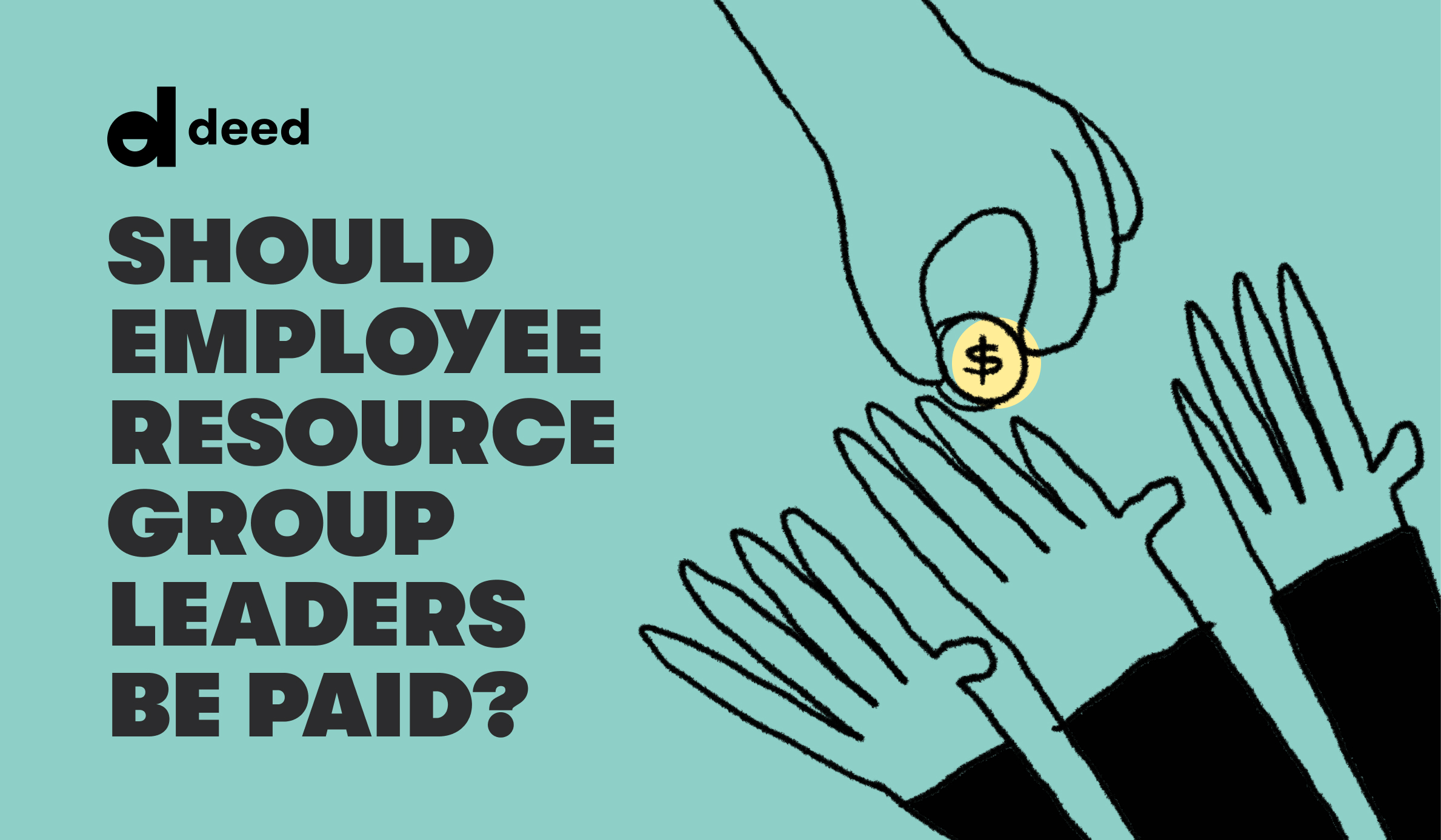Should Employee Resource Group Leaders be Paid?
Despite adding real value, only 28 percent of companies compensate ERG organizers.
DEED’S FIRST ERG: QUEER+ALLIES@DEED
Deed is totally focused on building resilient, purpose-driven communities. That’s why we recently launched our first employee resource group (ERG), Queer+Allies@Deed. It’s a welcoming space for all LGBTQIA+ people, friends, family members, and supporters to share their experiences, enjoy cultural events, and draft policies that will help Deed remain always at the forefront of diversity, equity, inclusion, and belonging (DEIB). And we’re running it entirely on our own platform using the exciting new Communities feature!
I’ve been thinking a lot about how to make Queer+Allies@Deed as inclusive and impactful as possible. While we are very much in the early stages of development, and still thinking through our own policies, the founding team and I think it’s our responsibility, as the first ERG, to try to establish a strong precedent for all to follow. One important question is how much work is required of ERG leads, and how we can balance our roles as community leaders with existing commitments.
INTRODUCTION
Did you know that some companies are financially compensating ERG leads? Deed’s partner Culture Amp—who you know as a global leader in human resources and employee experience technology—offers “$3,000 compensation for up to four leads per ERG and $6,000 for one chair per group,” two of their equity strategy leads wrote in Fast Company.
When I learned about Culture Amp’s innovative program, I remembered a great point Deed’s founder Deevee Kashi made this summer at our team retreat in Berlin. He said this in the context of making Deed credits (company-sponsored donations) widely available to employees, but I think there’s a salient idea here in the context of ERGs, too. “There is nothing wrong with monetary incentives,” Deevee said. “In fact, they may be inevitable in the modern world. If meeting our employees where they’re at means assigning a dollar value to doing good, then we should work toward making that happen.”
In that spirit, I wanted to write this piece to help you think through the value ERGs bring to the table, and how we should treat their leaders.
WHAT DO ERG LEADS DO?
Employee resource groups are “voluntary, employee-led groups whose aim is to foster a diverse, inclusive workplace aligned with the organizations they serve," according to Great Place to Work. ERGs provide a unique opportunity for people working across various departments and time zones to come together around a shared identity (e.g., LGBTQIA+ and allies). Sometimes that means organizing cultural events, giving circles, and volunteer days; inviting speakers and hosting webinars; or even drafting policies to present to management (which is how many queer communities have won gender-affirming healthcare and gender-neutral bathrooms in their workplaces, by the way).
The initial list of roles may include:
- President
- Vice President
- Treasurer
- Secretary
- Events/Program Coordinator
- Committee Lead(s)
Companies of different sizes will have ERG leadership teams of different sizes. But all ERG leaders divide responsibility for helping their members feel more welcome and productive.
THE CASE FOR COMPENSATING ERG LEADS
The expectation that ERG leads can simply pull welcoming and effective programming out of a hat without meaningful recognition from the company can have real consequences. The Culture Amp team makes a compelling argument for paying extra in that Fast Company piece cited above:
[Not paying] can have devastating consequences for ERG leaders, including burnout and stalled career progression, as their work as an ERG leader doesn’t count as “real work” that is explicitly and specifically valued by their organization. Ironically, the current state of play entrenches the inequality that ERGs are striving to overcome and nearly requires them as leaders to sacrifice their own careers and well-being.
Put differently, “ERGs are kind of doing this course correction,” as Workday’s Sarah Johal told Morning Brew, referring to how groups focused on the unique needs of diverse employees tackle inequality. “Right now, as it stands, most of the time, companies are getting all of that ROI…the ERGs themselves are rarely,” Johal said. Women, LGBTQIA+, Black, Hispanic/Latino, AAPI, and other employees already face discrimination in treatment and pay. ERGs address those unique needs by helping to ensure everyone is paid fairly and feels comfortable in the workplace—an effort that brings real value to the company.
Recent polls show that more companies are beginning to buy that argument. In 2020, just 5.6 percent of companies paid ERG leads—but according to diversity consultancy The Rise Journey, that number ballooned to 28 percent last year.
If the trend continues—especially among the 90 percent of Fortune 500 companies that have ERGs—compensating ERG leads could become the norm.
CHALLENGES TO FAIR COMPENSATION
One argument against paying ERG leads is that, with limited resources, whatever money is available should be directed to programming that all members of the group can benefit from. Only paying the leaders may also create a sense of inequality among the group, especially among individuals who are already used to putting in extra unpaid hours just to garner the same recognition as their peers.
Theresa Welbourne, founder and CEO of the human capital technology and consulting firm eePulse, suggests incorporating all levels of ERG involvement in the performance review process. “If ERG work is viewed as positive during the performance appraisal and merit-pay allocation process, individuals will receive compensation for the totality of their work more fairly,” Welbourne says.
This is not to say that paying ERG leads off the table. Rather, it may be worth considering multiple strategies for how to give ERG members the recognition and compensation they deserve.
CONCLUSION
At a time when, despite economic insecurity, about half of companies are actually increasing their environmental, social, and governance (ESG) and DEIB spending in 2023 compared to this year, it’s important to focus on the long game. ERG leads dedicate extra time and energy to make the workplace more welcoming and inclusive.
Let’s continue to think through what it means to create welcoming communities that begin in but ultimately transcend the workplace. The question of whether and how much to pay ERG leads may not be easy to answer, but it is essential as we work to promote equity in our companies.
Speaking of communities, I’m so excited to be using Deed’s Communities feature to help run Queer+Allies@Deed, our first ERG. Seeing my friends and colleagues post on the social wall about Trans Awareness Week was especially meaningful to me, and I was so proud to help spread the word about nonprofits doing such life-saving work for the LGBTQIA+ community. We’d love to show you what Communities and the rest of the Deed platform can do for your ERGs. Book a free demo today.


